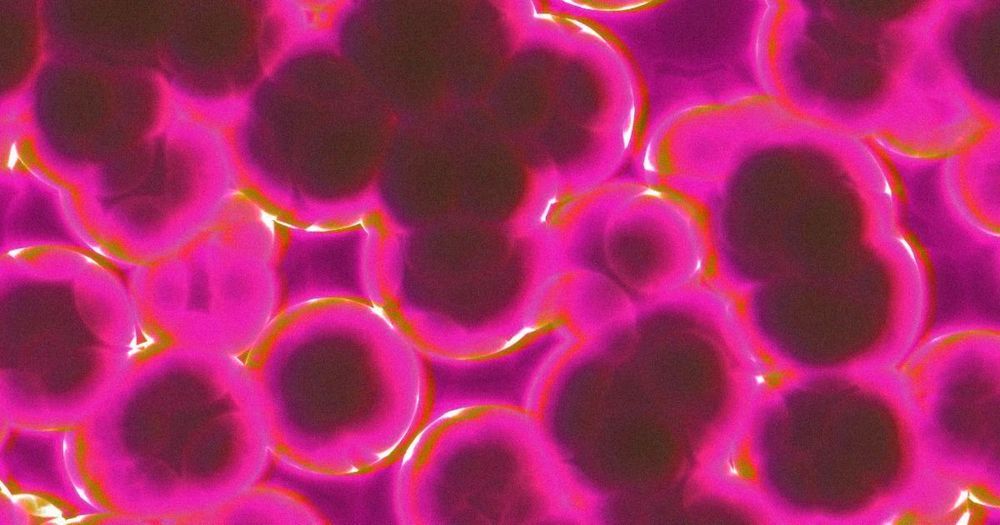Page 8969
Apr 8, 2019
Confirmed: New phase of matter is solid and liquid at the same time
Posted by Genevieve Klien in category: materials
Apr 8, 2019
How a New Cancer ‘Vaccine’ Fights Tumors Throughout the Body
Posted by Paul Battista in category: biotech/medical
A new cancer “vaccine” that’s injected directly into a single tumor can trigger the immune system to attack cancer cells throughout the body, a small new study suggests.
The researchers say that the experimental therapy essentially turns tumors into “cancer vaccine factories,” where immune cells learn to recognize the cancer before seeking it out and destroying it in other parts of the body. “[We’re] seeing tumors all throughout the body melting away” after injecting just one tumor, said lead study author Dr. Joshua Brody, director of the Lymphoma Immunotherapy Program at the Icahn School of Medicine at Mount Sinai in New York.
Still, the research, published today (April 8) in the journal Nature Medicine, is very preliminary. The therapy has only been tested in 11 patients with non-Hodgkin’s lymphoma (a cancer of immune system cells), and not all of these patients responded to the treatment. But some patients did have remission for relatively long periods, and the results were promising enough that the therapy is now also being tested in patients with breast and head and neck cancers, the authors said. [7 Odd Things That Raise Your Risk of Cancer (and 1 That Doesn’t)].
Continue reading “How a New Cancer ‘Vaccine’ Fights Tumors Throughout the Body” »
Apr 8, 2019
The Galaxy S10’s fingerprint reader was thwarted by a 3D printer
Posted by Quinn Sena in categories: 3D printing, privacy
Apr 8, 2019
Astronomers Have Detected Structures on The Sun That Lead to Weird ‘Plasma Rain’
Posted by Quinn Sena in category: space
It’s one of the most enduring mysteries of the Sun: why the superheated surface of this great ball of glowing plasma is actually cooler than its outer atmosphere, called the corona.
Scientists now have a new explanation for this hotly debated topic, and the answer was hidden in a strange solar phenomenon that’s never been observed quite like this before: a deluge of plasma rain falling within newly discovered magnetic structures called Raining Null Point Topologies.
On Earth, when it gets hot, water evaporates, turning into steam that lifts into the atmosphere, before cooling effectively reverses the process: water molecules condense inside clouds, which later drop rainfall over the land, oceans, and rivers below.
Apr 8, 2019
Deadly “Super Fungus” Could Be the Beginning of a Global Epidemic
Posted by Quinn Sena in category: biotech/medical
Bacteria’s ability to develop antibiotic resistance is well known — but it turns out fungi are also evolving to withstand modern medicine.
Now one such fungus is cropping up in hospitals all across the globe and killing half the people who contract it within 90 days, according to an alarming story by The New York Times — raising concerns about a new global epidemic.
Apr 8, 2019
AI systems should be accountable, explainable, and unbiased, says EU
Posted by Caycee Dee Neely in categories: governance, information science, robotics/AI, sustainability
Human agency and oversight — AI should not trample on human autonomy. People should not be manipulated or coerced by AI systems, and humans should be able to intervene or oversee every decision that the software makes. — Technical robustness and safety — AI should be secure and accurate. It shouldn’t be easily compromised by external attacks (such as adversarial examples), and it should be reasonably reliable. — Privacy and data governance — Personal data collected by AI systems should be secure and private. It shouldn’t be accessible to just anyone, and it shouldn’t be easily stolen. — Transparency — Data and algorithms used to create an AI system should be accessible, and the decisions made by the software should be “understood and traced by human beings.” In other words, operators should be able to explain the decisions their AI systems make. — Diversity, non-discrimination, and fairness — Services provided by AI should be available to all, regardless of age, gender, race, or other characteristics. Similarly, systems should not be biased along these lines. — Environmental and societal well-being — AI systems should be sustainable (i.e., they should be ecologically responsible) and “enhance positive social change” — Accountability — AI systems should be auditable and covered by existing protections for corporate whistleblowers. Negative impacts of systems should be acknowledged and reported in advance.
AI technologies should be accountable, explainable, and unbiased, says EU.
Apr 8, 2019
Dutchman ends ‘world’s longest electric car trip’ in Australia
Posted by Quinn Sena in categories: climatology, sustainability
A Dutchman completed an epic 95,000 kilometre (59,000 mile) journey by electric car in Sydney Sunday in a bid to prove the viability of such vehicles in tackling climate change.
Wiebe Wakker drove his retrofitted station wagon nicknamed “The Blue Bandit” across 33 countries in what he said was the world’s longest-ever journey by electric car.
The trip from the Netherlands to Australia took just over three years and was funded by public donations from around the world, including electricity to charge the Bandit, food and a place to sleep.
Continue reading “Dutchman ends ‘world’s longest electric car trip’ in Australia” »
Apr 8, 2019
Poisons flow in toxic levels through the veins of great white sharks, new study shows
Posted by Quinn Sena in category: biotech/medical
Great white sharks—one of the ocean’s most fearsome apex predators—thrive with toxic levels of poisons flowing in their veins, according to a new study by OCEARCH.
Researchers recently came to that conclusion after taking blood samples from 40 white sharks off South Africa, according to an April 3 report on OCEARCH.org.
The samples revealed “alarmingly high levels of poisonous heavy metals, like arsenic and mercury, in sharks’ blood,” says the report.
Apr 8, 2019
Digging ancient signals out of modern human genomes
Posted by Quinn Sena in category: biotech/medical
With new genome analysis tools, scientists have made significant advances in our understanding of modern humans’ origins and ancient migrations.
But trying to find ancient DNA, let alone prove that the ancient DNA is ancestral to a population living today is extremely challenging.
A new study in Molecular Biology and Evolution (MBE) adds to this understanding by reconstructing artificial genomes with the analyses of the genome of 565 contemporary South Asian individuals to extract ancient signals that recapitulate the long history of human migration and admixture in the region.

















